AMD Zen 3 Ryzen Deep Dive Review: 5950X, 5900X, 5800X and 5600X Tested
by Dr. Ian Cutress on November 5, 2020 9:01 AM ESTCPU Tests: Legacy and Web
In order to gather data to compare with older benchmarks, we are still keeping a number of tests under our ‘legacy’ section. This includes all the former major versions of CineBench (R15, R11.5, R10) as well as x264 HD 3.0 and the first very naïve version of 3DPM v2.1. We won’t be transferring the data over from the old testing into Bench, otherwise it would be populated with 200 CPUs with only one data point, so it will fill up as we test more CPUs like the others.
The other section here is our web tests.
Web Tests: Kraken, Octane, and Speedometer
Benchmarking using web tools is always a bit difficult. Browsers change almost daily, and the way the web is used changes even quicker. While there is some scope for advanced computational based benchmarks, most users care about responsiveness, which requires a strong back-end to work quickly to provide on the front-end. The benchmarks we chose for our web tests are essentially industry standards – at least once upon a time.
It should be noted that for each test, the browser is closed and re-opened a new with a fresh cache. We use a fixed Chromium version for our tests with the update capabilities removed to ensure consistency.
Mozilla Kraken 1.1
Kraken is a 2010 benchmark from Mozilla and does a series of JavaScript tests. These tests are a little more involved than previous tests, looking at artificial intelligence, audio manipulation, image manipulation, json parsing, and cryptographic functions. The benchmark starts with an initial download of data for the audio and imaging, and then runs through 10 times giving a timed result.
We loop through the 10-run test four times (so that’s a total of 40 runs), and average the four end-results. The result is given as time to complete the test, and we’re reaching a slow asymptotic limit with regards the highest IPC processors.
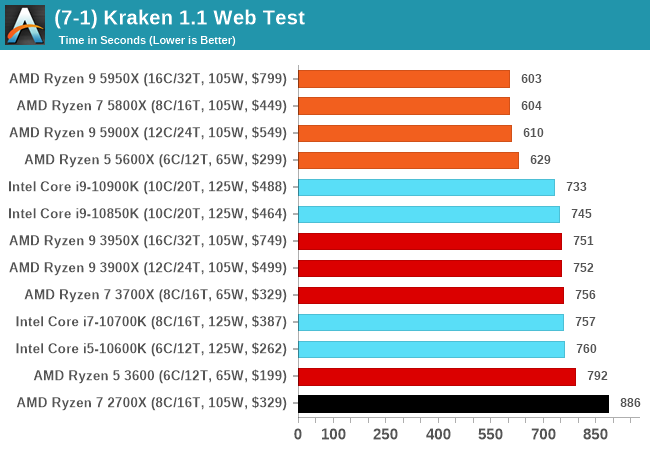
Google Octane 2.0
Our second test is also JavaScript based, but uses a lot more variation of newer JS techniques, such as object-oriented programming, kernel simulation, object creation/destruction, garbage collection, array manipulations, compiler latency and code execution.
Octane was developed after the discontinuation of other tests, with the goal of being more web-like than previous tests. It has been a popular benchmark, making it an obvious target for optimizations in the JavaScript engines. Ultimately it was retired in early 2017 due to this, although it is still widely used as a tool to determine general CPU performance in a number of web tasks.
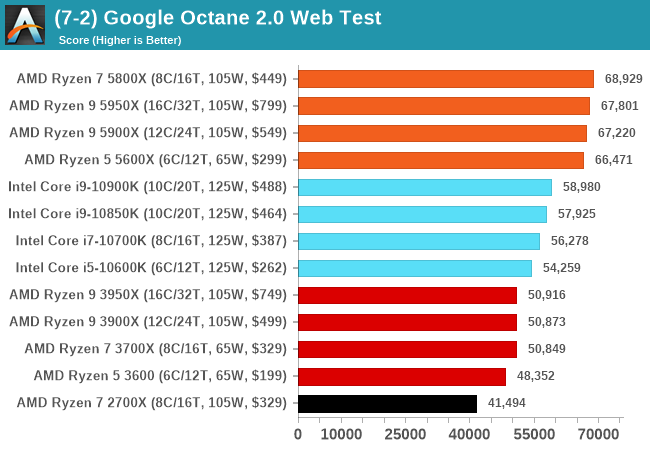
Speedometer 2: JavaScript Frameworks
Our newest web test is Speedometer 2, which is a test over a series of JavaScript frameworks to do three simple things: built a list, enable each item in the list, and remove the list. All the frameworks implement the same visual cues, but obviously apply them from different coding angles.
Our test goes through the list of frameworks, and produces a final score indicative of ‘rpm’, one of the benchmarks internal metrics.
We repeat over the benchmark for a dozen loops, taking the average of the last five.
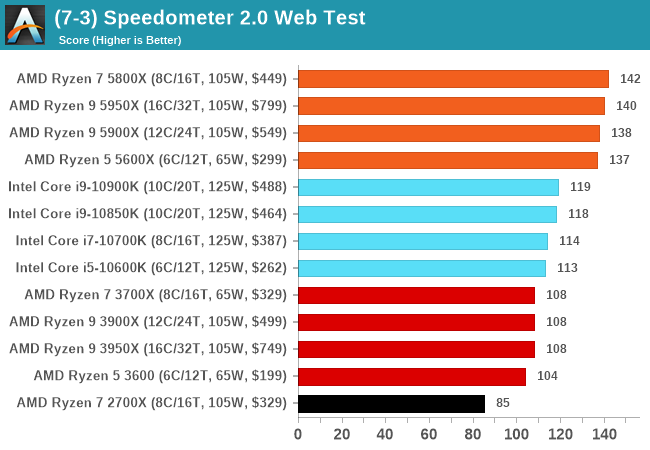
Legacy Tests
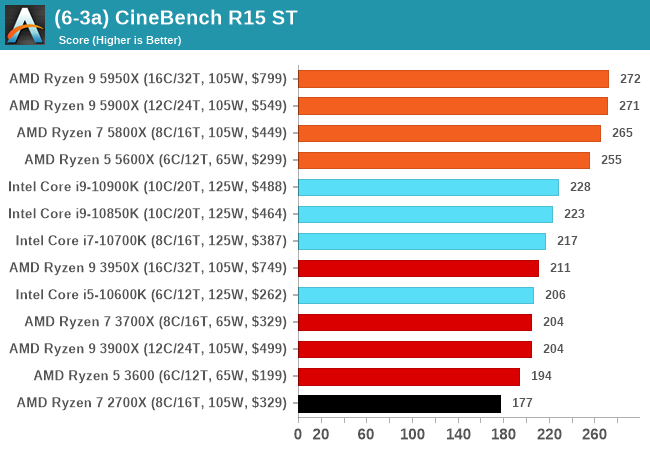
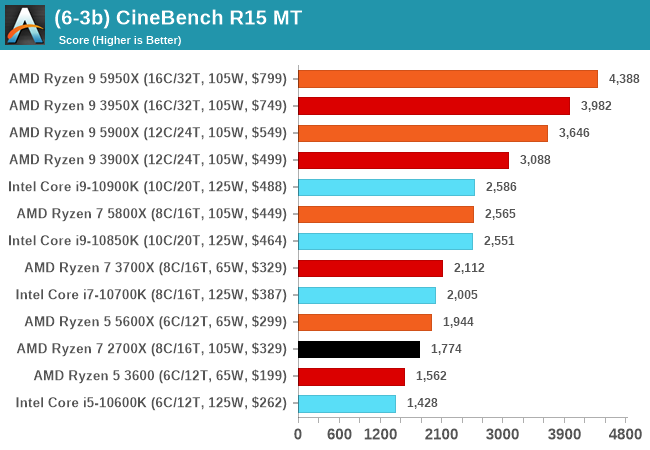
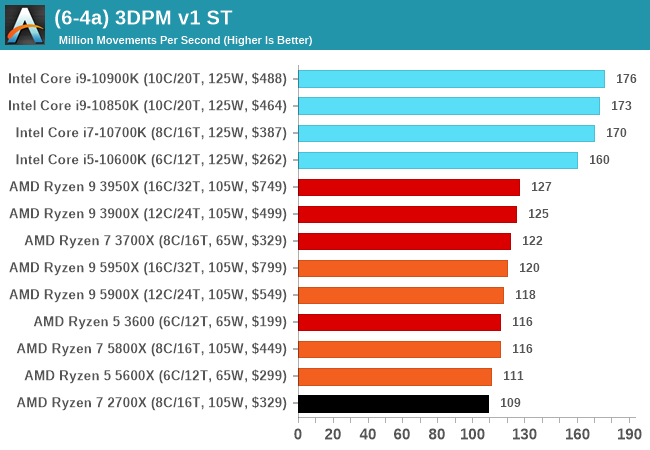
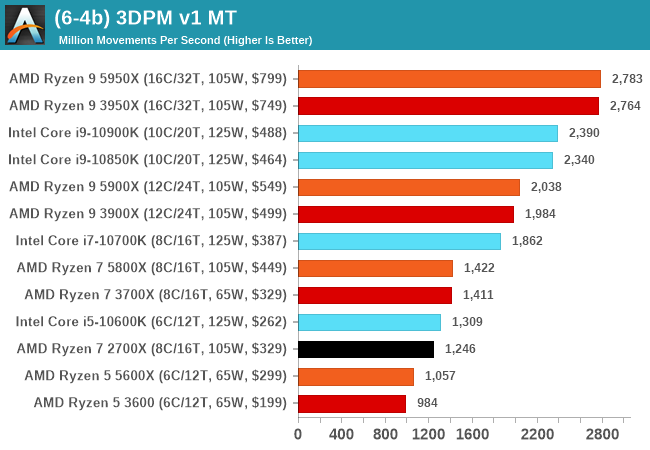


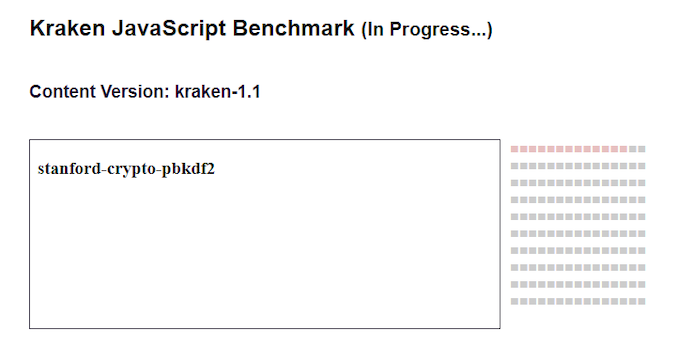
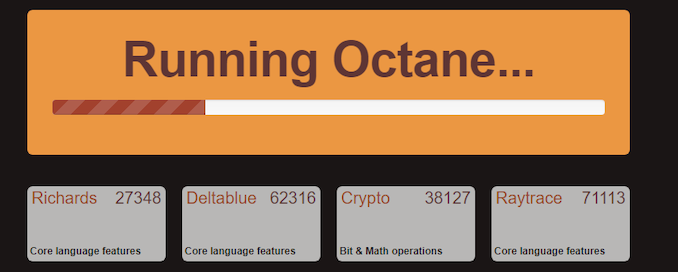
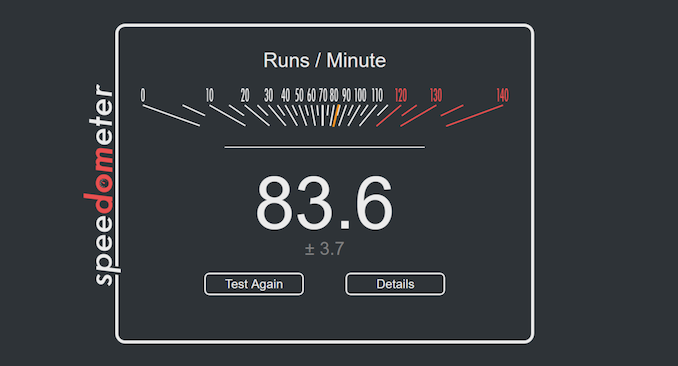








339 Comments
View All Comments
Luminar - Thursday, November 5, 2020 - link
Cache Rules Everything Around MeSIDtech - Thursday, November 5, 2020 - link
Hi Andrei,Excellent work. Do you know how this performance shapes up against the Cortex A77 ?
t.s - Friday, November 6, 2020 - link
Seconded. Want to know how the likes of ryzen 4 4350G or 5600 versus Cortex A77 or A78.Kangal - Saturday, November 7, 2020 - link
It's hard to say, because it really depends on the instruction/software as it is very situational. It also depends on the type of device it is powering, you can move up from Phones, to Thin Tablets, to Thick Laptops, to Large Desktops, and upto a Server. Each device offers different thermal constraints.The lower-thermal devices will favour the ARM chip, the mid-level will favour AMD, and the higher-thermal devices will favour Intel. That WAS the rule of thumb. In general, you could say Intel's SkyLake has the single-threaded performance crown, then AMD's Zen+ loses to it by a notable margin but beats it in multi-threaded tasks, and then going to an ARM Cortex A76 will have the lowest single-thread but the highest multi-threaded performance.
Now?
Well, there's the newly launched 2021 AMD Zen3 processor. And the upcoming 2021 ARM Cortex-X Overclocked Big-core using the new A78 microarchitecture. Lastly there's the 2022 Intel Rocket Lake yet to debut. So it's too early to tell, we can only make inferences.
Kangal - Saturday, November 7, 2020 - link
Here is my personal (yet amateur) take on the future 2020-2022 standpoints between the three racers. Firstly I'll explain what the different keywords and attributes mean(from most technical to most real-world implication)
Total efficiency: (think Full Server / Tractor) how much total calculations versus total power draw
Multi-threaded: (think Large Desktop / Truck) how much total calculations
Single-threaded: (think Thick Laptop / Car) how much priority calculations
IPC performance: (think Thin Tablet / Motorbike) how much priority calculations at desirable frequency/voltage/power-draw
*Emulating:
Having a "simple" ARM chip running "complex" x86 instructions. Such as running 32bit or 64bit OS X or Windows programs, via new techniques of emulation using a partial-hardware and hybrid-software solutions. I think the hit to efficiency will be around x3, instead of the expected x12 degradation.
So here are the lists (from most technical to most real-world implication)
Simple Code > Mixed code > Recommended Solution
Here's how they stack up when running identical new code (ie Modern Apps):
Total efficiency: ARM >>>> AMD >> Intel
Multi-threaded: ARM > AMD > Intel
Single-threaded: Intel = AMD > ARM
IPC performance: ARM >>> AMD > Intel
Now what about them running legacy code (ie x86 Program):
Efficiency + *emulating: AMD > Intel >> ARM
Multi + *emulating: AMD > Intel >> ARM
1n + *emulating: Intel = AMD >>> ARM
IPC + *emulating: AMD > Intel > ARM
My recommendation?
Full Server: 60% legacy 40% new code. This makes ARM the best option by a small margin.
Large Desktop: 80% legacy 20% new code. AMD is the best option with modest margin.
Thick Laptop: 70% legacy 30% new code. Intel is the best. AMD is very close (tied?) second.
Thin Tablet: 10% legacy 90% new code. ARM is the best option by huge margin.
Tomatotech - Monday, November 9, 2020 - link
Excellent post, but worth pointing out that *all* modern chips now emulate x86 and x64 code. They run a front end that takes x86 / x64 machine code then convert that into RISC code and that goes through various microcode and translation layers before being processed by the backend. That black box structure has allowed swapping out and optimising the back end for decades while maintaining code compatibility on the front end.So it’s not as simple to differentiate between the various chips as you make it out to be.
Gondalf - Sunday, November 8, 2020 - link
I don't know. Looking Spec results, we can say Anandtech is absolutely unable to set a Spec session correctly. From the review Zen 2 is slower per Ghz than old Skylake in integer, that is absolutely wrong in consumer cores (in server cores yes), even worse Ice Lake core is around fast as old Skylake per GHz.Basically this review is rushed and very likely they have set all AMD compiler flags on "fast" to do more contacts and a lot of hipe.
My God, for Anandtech Zen 3 is 35% faster in the global Spec values than Zen 2. Not even AMD worst marketing slide say this. We have Zen 4 here not Zen 3. Wait wait please.
A really crap review, the author need to go back to school about Spec.
Obviously the article do not say that 28W Tiger Lake is unable to run at 4.8Ghz for more than a couple of seconds, after this it throttes down, so the same Willow Cove core on a desktop Cpu could destroy Zen 3 without mercy on a CB session. Not to mention the far slower memory subsystem of a mobile cpu.
Basically looking at games results, Rocket Lake will eclipse this core forever. AMD have nothing of new in its hands, they need to wait Zen 4
Qasar - Sunday, November 8, 2020 - link
yea ok gondalf, trying to find ways that your beloved intel doesnt lose at everything now ??accept it, amd is faster then intel across the board.
Spunjji - Monday, November 9, 2020 - link
That's a strange claim about Tiger Lake performance, Gondalf, because I seem to recall Intel seeding all the reviewers with a laptop that could run TGL at 4.8Ghz boost 'til the cows come home - and that's what Anandtech used to get that number. It's literally the best they can do right now. You're right of course - in actual shipping ultrabooks, TGL is a hot PoS that cannot maintain its boost clocks. Maybe by 2022 they'll finally put Willow Cove into a shipping desktop CPU."Basically looking at games results, Rocket Lake will eclipse this core forever"
If by "eclipse" you mean gain a maximum 5% advantage at higher clock speeds and nearly double the power draw then sure, "eclipse", yeah. 🤭
I love your posts here. Please, never stop stepping on rakes like Sideshow Bob.
macroboy - Saturday, December 12, 2020 - link
LOL look at AMD's Efficiency and sustained core clocks, Intel runs too hot to stay at 5ghz for very long. meanwhile Zen3 plows along at 55C no problem, *you're the one who needs to check your facts.